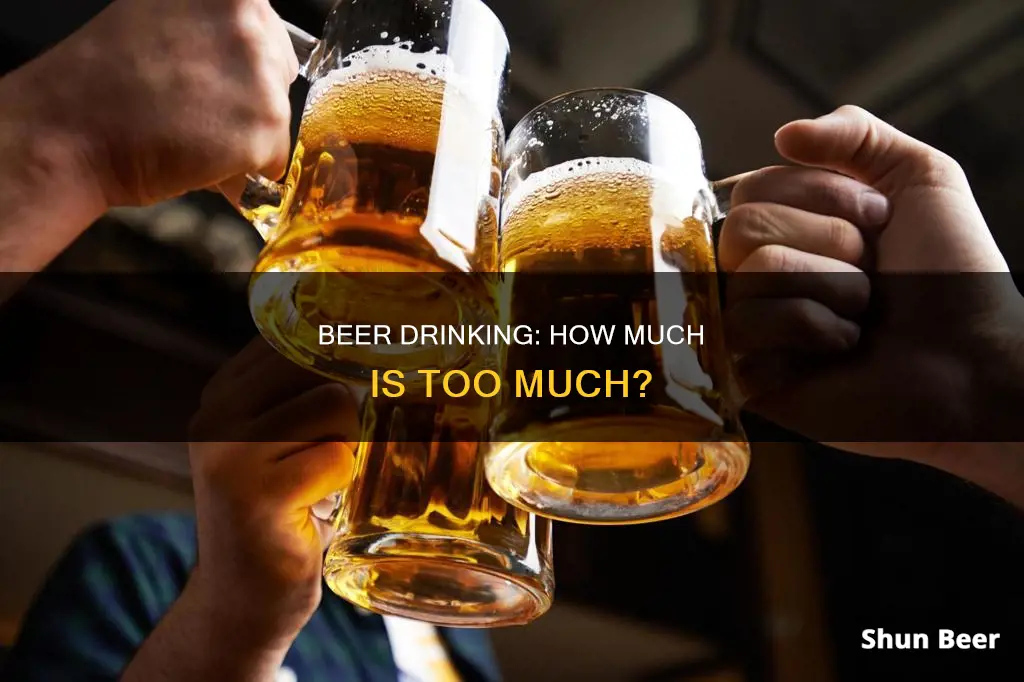
Drinking a case of beer, which typically contains 24 cans or bottles, is generally considered excessive and can lead to serious health issues. While occasional or moderate drinking may not be harmful, heavy beer consumption can increase the risk of unintentional injuries, violence, memory problems, early dementia, chronic diseases, gastrointestinal issues, and even cancer. It is important to consume alcohol in moderation, following guidelines that recommend limiting daily intake to two drinks or less for men and one drink or less for women.
| Characteristics | Values |
|---|---|
| Number of cans/bottles | 12 or 24 |
| Volume of each can/bottle | 12 oz. |
| Weight of a case | 20 lbs. for 12-oz cans; up to 40 lbs. for bottled craft beer |
| Dimensions of a 24-pack | 16 3/4 x 11 1/4 x 10 1/2 inches |
| Price of a 24-pack | $9.07 on average |
What You'll Learn

Is drinking a case of beer considered binge drinking?
Drinking a case of beer is considered binge drinking. Binge drinking is defined by the Centers for Disease Control and Prevention (CDC) as "a pattern of drinking that brings a person's blood alcohol concentration (BAC) to 0.08 g/dl or above." This typically occurs when men consume five or more drinks or women consume four or more drinks within two hours. A case of beer typically contains 24 bottles or cans, which is significantly more than the binge drinking threshold for both men and women.
Binge drinking is a serious issue that can lead to negative health consequences and increase the risk of developing an alcohol use disorder. It is associated with unintentional injuries, violence, risky sexual behaviors, memory problems, mental health issues, immune system dysfunction, and various chronic diseases, including liver disease, heart disease, and cancer.
The effects of drinking a case of beer can be detrimental to an individual's health and well-being. It is important to drink in moderation and be mindful of the negative consequences that can arise from excessive alcohol consumption.
While drinking a case of beer may be considered binge drinking, it is essential to note that the definition of binge drinking can vary depending on factors such as body weight, metabolism, and alcohol tolerance. Additionally, the alcohol content of beer can vary, with some beers having a higher alcohol by volume (ABV) than others. Therefore, the number of beers consumed to reach the binge drinking threshold may differ from person to person and beer to beer.
If you or someone you know is struggling with binge drinking or alcohol abuse, it is important to seek professional help. There are many resources available, including treatment facilities, support groups, and hotlines that can provide assistance and support in addressing problematic drinking behaviors.
The Science Behind Foam Beer Koozies: Do They Work?
You may want to see also

What are the health implications of drinking a case of beer?
Drinking a case of beer, which is typically 24 beers, in one sitting is likely to be harmful to your health. Excessive alcohol consumption can lead to a range of negative health consequences, including:
- Unintentional injuries, such as car crashes
- Violence, including domestic violence, sexual assault, and homicide
- Risky sexual behaviours, which can result in unintended pregnancies and STIs
- Miscarriage, stillbirth, or fetal alcohol syndrome in pregnant women
- Problems with memory and learning
- Early and permanent dementia
- Inflammation and damage to tissues and organs
- Chronic diseases, such as liver disease, heart disease, stroke, high blood pressure, and cancer
- Ulcers and gastrointestinal issues
- Malnourishment and vitamin deficiency
- Weakened immune system
- Higher risk of obesity
- Depression and anxiety
Long-term excessive drinking can also affect your personal and professional life, leading to decreased productivity at work, job loss, financial issues, and problems with friends and family.
In addition, drinking a case of beer can have immediate effects on your health, including:
- Blackouts
- Drowsiness
- Low blood sugar
- Vomiting
- Diarrhea
- Irregular heartbeat
- Hypothermia
- Trouble controlling emotions
- Loss of coordination
- Seizures
- Trouble breathing
To reduce the risk of negative health consequences, it is recommended to limit your intake to no more than one standard drink per day for women and two for men. Excessive drinking is defined as eight drinks or more per week for women and at least 15 drinks per week for men.
Beer Station on Carnival Fantasy: How Does It Work?
You may want to see also

How much does a case of beer cost?
The cost of a case of beer varies depending on the type of beer, the place of purchase, and the location. On average, a case of domestic beer costs around $12 to $15 at retail and around $6 to $7.50 wholesale. Craft beers are more expensive, costing around $20 to $30 for a 12-pack at retail and $10 to $20 per case wholesale.
In the United States, the cost of a case of beer also varies by state. As of 2024, the state with the cheapest beer is Illinois, with an average cost of $16.43 for a case of beer. Other inexpensive states include North Carolina, South Carolina, New York, and Kansas, with average case prices ranging from $16.72 to $17.30. Alaska has the highest beer prices, with an average cost of $33.62 per case. Other expensive states include Tennessee, Montana, Vermont, and Pennsylvania, with average case prices ranging from $23.21 to $24.06.
It's worth noting that these prices may not include additional taxes or fees, such as recycling fees, which can vary by state and retailer. The type of beer and the place of purchase can also impact the cost. For example, buying in bulk or from wholesale retailers can often result in lower prices per case.
Historically, the cost of beer has been much lower. In the past, it was common to find cases of beer for $8 to $10 in the United States. However, due to inflation and the rising cost of living, beer prices have increased over time.
The Magic of Auto-Fill Beer Cups: How Do They Work?
You may want to see also

Is drinking a case of beer a sign of alcoholism?
Drinking a case of beer—which is typically defined as 12 ounces of beer—in a day is considered excessive drinking. Excessive drinking is often categorised into binge drinking and heavy drinking. Binge drinking for men is defined as consuming five or more drinks within two hours, and for women, it is defined as consuming four or more drinks within two hours. On the other hand, heavy drinking is defined as drinking eight or more drinks per week for women and 15 or more drinks per week for men.
Drinking a case of beer in a day falls under binge drinking for men and heavy drinking for women. Binge drinking is a pattern of drinking that brings a person's blood alcohol concentration (BAC) to 0.08 g/dl or above. This can lead to a range of health problems, including unintentional injuries, violence, risky sexual behaviours, memory problems, early and permanent dementia, inflammation and damage to tissues and organs, chronic diseases, ulcers and gastrointestinal issues, malnourishment and vitamin deficiency, weakened immune system, higher risk of obesity, depression, and anxiety.
While drinking a case of beer may not automatically indicate alcoholism, it is a sign that one's drinking habits are becoming problematic and harmful to one's health. Alcoholism is characterised by physical dependence on alcohol, and it is the most severe form of problem drinking. Signs of alcoholism include tolerance, withdrawal, loss of control over drinking, inability to quit, giving up other activities, alcohol taking up a lot of energy and focus, and continued drinking despite negative consequences.
If you or someone you know is struggling with excessive drinking or alcoholism, it is important to seek professional help and support to address the issue.
A Beer Lover's Guide to Mohegan Sun Fest
You may want to see also

What are the social implications of drinking a case of beer?
Drinking a case of beer has a variety of social implications, both positive and negative. Beer is often consumed in social contexts, and its consumption is considered a social activity. Beer is frequently consumed at social gatherings such as dinners and parties, and its presence is common at celebrations and informal settings. This makes beer a "social glue" that brings people together and creates a sense of community. Beer consumption can lower social barriers and facilitate open dialogue, making it beneficial for marginalised groups such as racial minorities, LGBTQIAA2S+ individuals, and socio-economically disadvantaged people.
However, there are also negative social implications associated with drinking a case of beer. Excessive alcohol consumption, including binge drinking, can lead to accidents, injuries, violence, and health issues. It can also result in negative social outcomes such as impaired brain development and increased risk of chronic diseases, including certain types of cancer. Additionally, alcohol misuse can have economic costs for society, including loss of workplace productivity and increased healthcare expenses.
From a social perspective, drinking a case of beer can have both positive and negative consequences. While it may foster social connections and inclusivity, excessive consumption can lead to negative health and social outcomes. Therefore, it is essential to promote responsible drinking and raise awareness about the potential risks associated with excessive alcohol consumption.
Drinking Beer and Driving in Mississippi: What's Allowed?
You may want to see also
Frequently asked questions
Yes, drinking a case of beer is considered excessive drinking. Excessive drinking is categorised into binge drinking and heavy drinking. Binge drinking is defined as consuming five or more drinks within two hours for men and four or more drinks within two hours for women. Heavy drinking is defined as consuming eight or more drinks per week for women and 15 or more drinks per week for men.
Drinking a case of beer can increase the risk of many serious health issues, including unintentional injuries, violence, risky sexual behaviours, memory problems, early dementia, inflammation, chronic diseases (such as liver disease, heart disease, stroke, high blood pressure, and cancer), gastrointestinal issues, weakened immune system, and mental health issues such as depression and anxiety.
The amount of alcohol in a case of beer depends on the number of beers and their alcohol content. A standard case of beer contains 24 12-ounce cans or bottles, which would be 288 ounces of beer. Assuming a typical alcohol content of around 5% ABV for a beer, a case of beer would contain about 14.4 ounces or 432 grams of pure alcohol.







